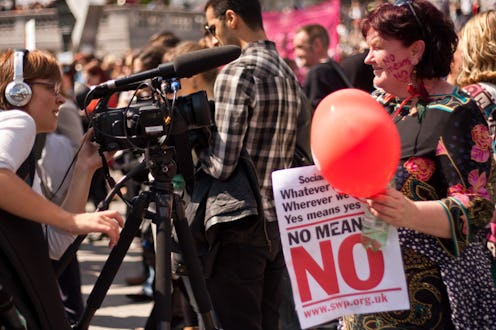
We hear a lot of complaints from adults these days about how complicated consent is — yet many kids seem to have no problem understanding it. In fact, as several lessons about consent from kids (which have all gone viral, of course) have taught us, children sometimes understand the concept much better than most adults do. Maybe "yes means yes" isn't so complicated after all.
The standard known as affirmative consent, under which you should only have sex with someone enthusiastic about the encounter, is actually intended to simplify sexual consent. According to this guideline, the only question you need to ask yourself to determine whether you have consent is: "Did the other person say 'yes'?" Feminist author and activist Jaclyn Friedman recently pointed out in The Washington Post that the college students she works with typically are grateful for the affirmative consent laws that older adults sometimes complain about. Affirmative consent, she says, "teaches people of all genders that it’s easy to make sure you’re not hurting anyone during sex: Just show up and pay attention to your partner; listen to what they’re telling you; and if you can’t tell, you have to ask." But some members of an even younger crowd have also embraced consent — and understood that the same principles of affirmative consent can apply to situations beyond sex, like making plans or giving gifts.
To clear up the concept even further, here are some lessons about consent from a seemingly unlikely source: kids. Some of these stories are touching; others are hilarious; and all will give you a better sense of both what consent means and how to explain it. Oh, and they also just might give you a bit of hope for the next generation.
1. Seven-Year-Old Sage Told Off Another Boy For Pulling A Girl's Hair While In Line To See Santa
A recent post on the Consent Crew blog shares a story related by a father whose son, Sage, has an impressive understanding of consent. While waiting in line to talk to Santa, Sage noticed a boy repeatedly pulling a girl's hair. When Sage finally said "Stop that! You're hurting her!" the boy's mother responded, “He just likes her. He thinks she’s pretty. Don’t you think girls are pretty?” To that, he also had an amazing comeback: “What does her being pretty have to do with hurting her?” This comment not only defended her but also addressed victim-blaming by pointing out that how pretty someone is or what they wear is not a reason to touch them without their permission.
But this point flew over the mother's head, and the girl started complaining that the hair-pulling hurt. So, finally, Sage took matters into his own hands and punched the boy. When the mom asked Sage what he was doing, he repeated her language: “I think he’s pretty. I just wanted to get his attention.” While I wouldn't necessarily advocate punching, especially when a man (or boy) does it on behalf of a woman (or girl) who could defend herself if she wanted to, Sage did brilliantly point out the double-standard that excuses acts of aggression toward women while respecting men's autonomy: Hurting a girl to get her attention was "OK," while hurting a boy was deemed unacceptable.
But the story gets better. When Santa asked Sage if he had been good, he responded that he had with the exception of punching a boy for pulling a girl's hair — to which Santa said, “I’d say you’ve been very good, then.”
2. A Little Boy Named James Stood Up To A Catcaller
When Julia Price was out running, a man in business attire repeatedly yelled "Sexy lady" at her, resorting to "eff you, dumb bitch!" when she ignored him. Then, she turned around to say something, but a little boy beat her to it. "Hey. That is not nice to say to her and she didn't like you yelling at her. You shouldn't do that because she is a nice girl and I don't let anyone say mean things to people." The man left.
Because catcalling often leaves its victims ashamed, especially when the harasser criticizes them for not responding, it can be helpful to be called a "nice girl" right after you've been called a bitch. And while I'm sure Price could have stood up for yourself, she appreciated the support so much that she hugged the boy, James. He responded, "I just wanted to make sure your heart was okay."
3. Angus Johnston's Daughter Reminded Him "My Body, My Choice" Applies To All Situations
Historian and student activism advocate Angus Johnston wrote about what a trip to the ice cream shop with his daughter taught him about consent. After he tasted tarragon and pink peppercorn ice cream, he felt his eight-year-old just had to try it. After she declined, he responded, "Just one taste." Then, she retorted with a phrase he'd taught her: “My body, my choice.”
Though he had used this phrase to empower her to reject hugs, tickles, and clothing she didn't want to wear, he didn't realize that it applied to the situation at hand. While "my body, my choice" is often a pro-choice motto, it also applies to everything from who we sleep with to what we eat, and Johnston's daughter provided a friendly reminder of that.
Images: Garry Knight/Flickr; Giphy(2), Julia Price/Facebook